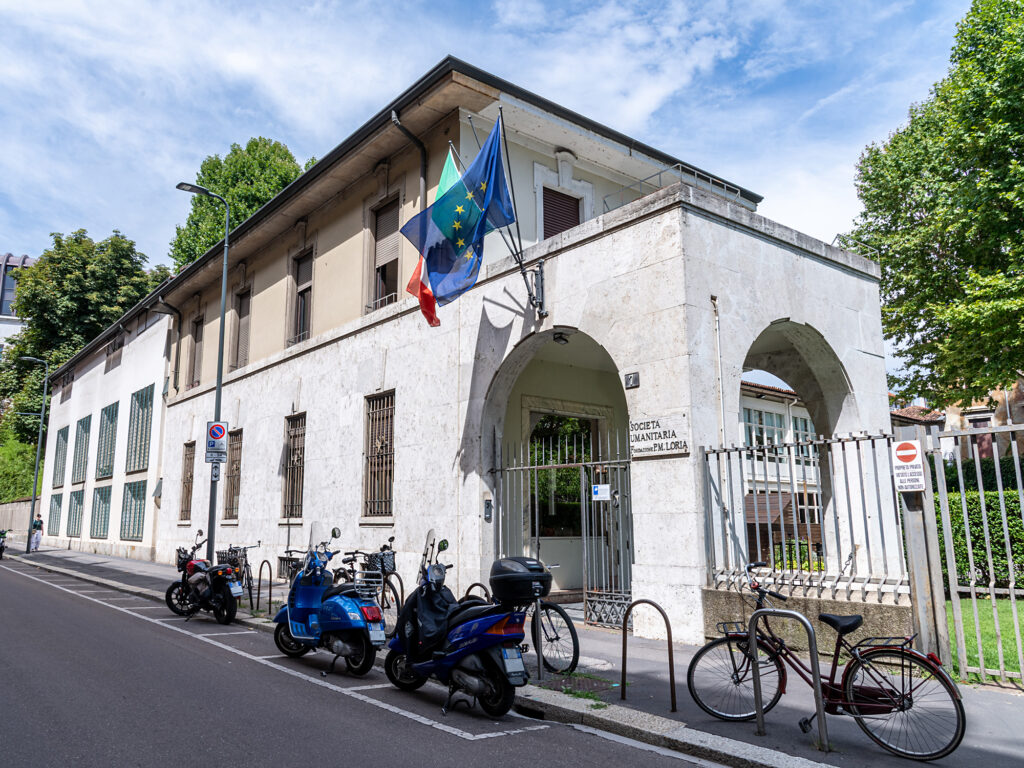
La Società Umanitaria è una delle più importanti istituzioni di Milano. La sua nascita risale al 29 giugno 1893, quando venne riconosciuto giuridicamente lo statuto ed il lascito testamentario di Prospero Moisè Loria, il mecenate milanese di origine mantovana, che aveva voluto la costituzione di una nuova istituzione, il cui scopo fosse quello di “mettere i diseredati, senza distinzione, in condizione da rilevarsi da sé medesimi, procurando loro appoggio, lavoro ed istruzione”.
Parlare di “diseredati, senza distinzione”, voleva dire che non ci si sarebbe limitati a dare transitoriamente una mano ai miserabili e agli emarginati bisognosi di carità, ma che si guardava a una platea più ampia, a tutto il Quarto Stato (milanese e non solo), verso il quale si doveva intervenire fattivamente, dandogli i mezzi per uscire dal suo stato, e di non ricadervi o di non cadervi mai, avendo ricevuto non solo un momentaneo “appoggio”, ma anche, e soprattutto, “lavoro ed istruzione”: due elementi destinati a rimanere associati e a costituire la principale chiave di volta dell’azione dell’Umanitaria per tutto il XX secolo.
Nonostante dopo l’atto costitutivo l’Umanitaria fosse rimasta come in stand-by (prima a causa di alcuni problemi giuridici con gli eredi del Loira che impugnarono il testamento, poi per la repressione imposta dal generale Bava Beccaris durante i moti milanesi del 1898), non per questo il gruppo dirigente rimase in letargo, in attesa di tempi migliori. Così, quando il 3 gennaio 1902 si insediò il primo Consiglio Direttivo (al cui interno c’erano uomini di varia estrazione ideologico e politica, accumunati da un idem sentire, un riformismo concreto e illuminato – da Luigi Della Torre a Luigi Majno, da Cesare Saldini a Rosa Genoni, da Osvaldo Gnocchi Viani a Giovanni Battista Alessi, da Alessandrina Ravizza ad Augusto Osimo), l’Umanitaria aveva già le idee chiare su come mettersi all’opera, per adempiere le finalità del filantropo fondatore, aggiornandole con motivazioni, intenti e impegno adatti al mutamento dei tempi.
Se molteplici e diversificati furono i settori di intervento che ne avrebbero guidato l’azione, coniugando assistenza e lavoro, impegno sociale ed istruzione, progresso e formazione, emancipazione e cultura, in sintesi si possono individuare quattro filoni:
- Lavoro (lotta alla disoccupazione, uffici di collocamento, Casa di Lavoro, normative);
- Emigrazione (assistenza e preparazione degli emigranti, cooperazione in città e campagna, mutualità, edilizia popolare);
- Istruzione (scuole d’arti e mestieri, biblioteche popolari, orientamento e riqualificazione professionale, emancipazione della donna, Teatro del Popolo);
- Educazione degli adulti (dal 1945, con i corsi residenziali organizzati in tutta Italia).
Un arco di iniziative e interventi davvero impressionante, che fece meritare ai dirigenti dell’Umanitaria nella prima metà del ‘900 l’appellativo di “pionieri di arditezze sociali”, nel solco di una tradizione ambrosiana che ha saputo ispirare sane e profonde riforme sociali, sempre “dal basso”: dalla Scuola del Libro ai quartieri popolari, dalla Casa degli Emigranti alle Case dei bambini della Montessori, dai corsi serali di perfezionamento e riqualificazione all’Università di Arti Decorative alla Villa Reale di Monza all’Ufficio di assistenza legale per i poveri, fino all’esperimento della Scuola Media Unica, a metà degli anni ‘50, e alla realizzazione, in coordinamento con la Cassa del Mezzogiorno, dei primi Centri di Servizi Culturali in Sardegna e in Puglia.
Data l’enorme mole di vicende, aneddoti, documenti e testimonianze, la storia della Società Umanitaria si può conoscere attraverso la serie di filmati denominati Tracce di memoria oppure sfogliando la brochure Il cammino della Società Umanitaria, che riassume – da fine ‘800 ai giorni nostri – le vicende più significative di una “istituzione veramente insolita”.